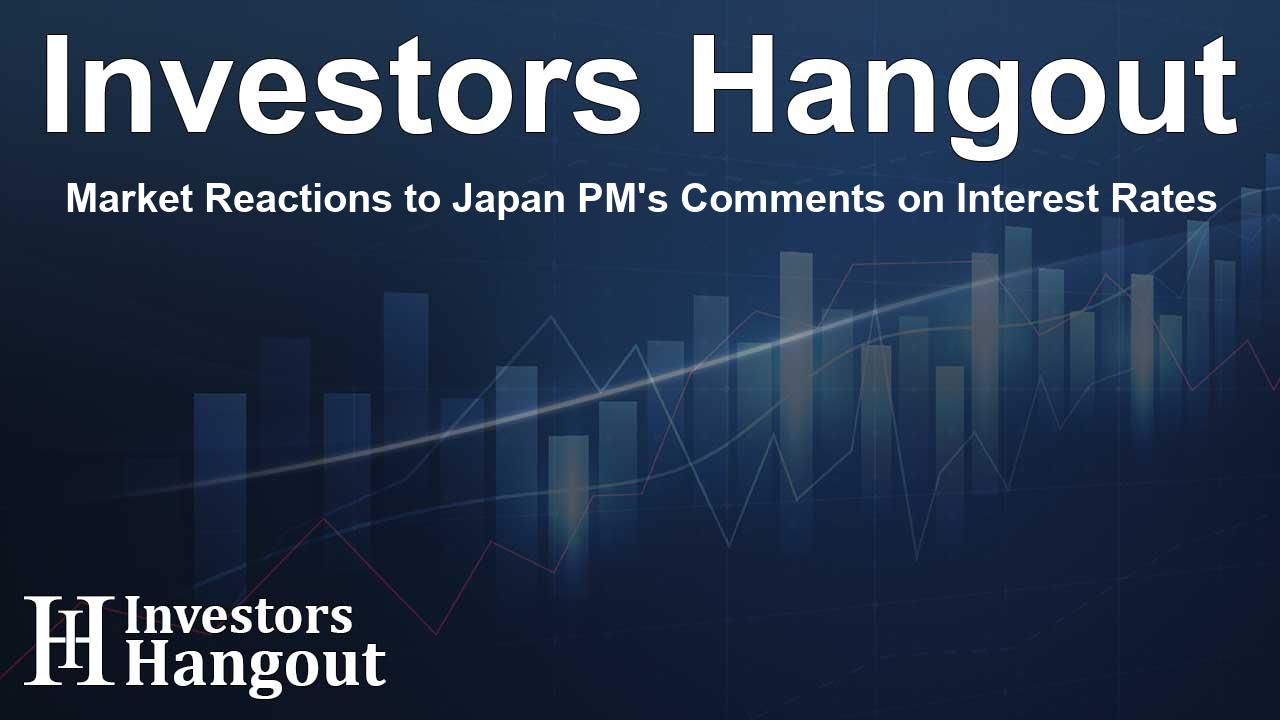Market Reactions to Japan PM's Comments on Interest Rates

A Deep Dive into Japan's Shifting Economic Landscape
Recent commentary from Japan's new Prime Minister, Shigeru Ishiba, regarding the nation's monetary policy has sent ripples through Asian markets, particularly affecting the value of the yen. After meeting with Bank of Japan governor Kazuo Ueda, Ishiba stated, "I do not believe that we are in an environment that would require us to raise interest rates further." This sentiment ignited a significant wave of yen selling, causing it to drop nearly 2% against the dollar—a notable decline reminiscent of high volatility periods.
The Impact of Ishiba's Direct Remarks
Such a drastic fall of the yen, marking its largest daily drop since February of the previous year, raises eyebrows within the financial community. Excluding pandemic-related market swings, this represents one of the sharpest declines in over ten years. While meetings between a prime minister and the central bank's governor are routine, Ishiba's candidness on such critical issues was highlighted as "somewhat unseemly" by economic analyst Phil Suttle. Such comments seem to indicate a marked shift in Japan's approach to monetary policy that traders are keenly digesting.
Market Expectations and Future Projections
Market analysts, including those at JP Morgan, predict that Ishiba's administration might adopt a market-friendly approach through the summer, aligning with Japan's upcoming upper house election. By providing such reassurances, Ishiba's government could alleviate some market-induced worries about future economic growth, even amidst a backdrop of a weakening yen.
Current Trading Position of the Yen
As it stands, the decline of the yen reflects a drastic positioning within the markets. Data from the U.S. futures markets shows that hedge funds are holding their most considerable 'long' position in yen since 2016, showcasing a collective belief in a rebound. Such positioning intensifies the effect of Ishiba's statements, drawing a stark picture of investor sentiment amidst these unpredictable shifts.
Asian Markets React to Global Trends
Elsewhere in the Asian landscape, notable figures such as Thailand's finance minister will be addressing audiences on the same day that Ishiba's remarks are stirring significant discussions. The regional economic calendar is packed, with the release of purchasing managers index (PMI) data from Australia and Singapore, and trade statistics from Australia anticipated to shape market expectations as well.
Global Economic Context
As global events unfold, the dollar's strength has been bolstered not only by the yen's decline but also by favorable U.S. economic reports recently released. The dollar recently reached a three-week high against various currencies due to these influencing factors. Meanwhile, growing geopolitical tensions, particularly involving Iran and Israel, have led to an increased demand for safe-haven assets like the dollar, simultaneously boosting oil prices. Notably, Brent crude oil recently surpassed $76 a barrel for the first time in a month, highlighting the volatile nature of commodity markets.
Trade Relations Impacted by Tariffs
Another focal point for investors is the upcoming vote by France, Greece, Italy, and Poland on imposing steep tariffs—up to 45%—on imports of electric vehicles from China. This decision could signify a major shift in trade dynamics within the European Union, sparking fears of a trade backlash from Beijing. Finance Minister Christian Lindner of Germany has stated that the country opposes such a proposal, advocating for cooperation over confrontation in crucial trade sectors.
Key Economic Indicators to Watch
As the markets continue to assess the implications of Ishiba's remarks and global economic conditions, several data points will be pivotal for traders looking to navigate through this complexity. Key indicators to monitor include:
- Australian trade data for August
- Purchasing Managers' Index reports for Japan, Australia, and Singapore for September
- Retail sales figures from Hong Kong for August
Frequently Asked Questions
What did Japan's Prime Minister Shigeru Ishiba say about interest rates?
Shigeru Ishiba stated that he does not believe the current environment necessitates further interest rate increases.
How did the yen respond to Ishiba's comments?
The yen dropped nearly 2% against the dollar, marking one of its most significant daily declines in over a decade.
What are analysts predicting for Japan's monetary policy?
Analysts expect a market-friendly policy stance from Ishiba's administration until the next upper house election scheduled for next summer.
What global factors are influencing the dollar's strength?
The dollar's strength has been impacted by favorable U.S. economic data and geopolitical tensions, particularly in the Middle East.
What tariffs are being proposed in the European Union?
A vote is planned to impose tariffs of up to 45% on imports of electric vehicles from China, which could lead to retaliation from Beijing.
About Investors Hangout
Investors Hangout is a leading online stock forum for financial discussion and learning, offering a wide range of free tools and resources. It draws in traders of all levels, who exchange market knowledge, investigate trading tactics, and keep an eye on industry developments in real time. Featuring financial articles, stock message boards, quotes, charts, company profiles, and live news updates. Through cooperative learning and a wealth of informational resources, it helps users from novices creating their first portfolios to experts honing their techniques. Join Investors Hangout today: https://investorshangout.com/
Disclaimer: The content of this article is solely for general informational purposes only; it does not represent legal, financial, or investment advice. Investors Hangout does not offer financial advice; the author is not a licensed financial advisor. Consult a qualified advisor before making any financial or investment decisions based on this article. The author's interpretation of publicly available data shapes the opinions presented here; as a result, they should not be taken as advice to purchase, sell, or hold any securities mentioned or any other investments. The author does not guarantee the accuracy, completeness, or timeliness of any material, providing it "as is." Information and market conditions may change; past performance is not indicative of future outcomes. If any of the material offered here is inaccurate, please contact us for corrections.